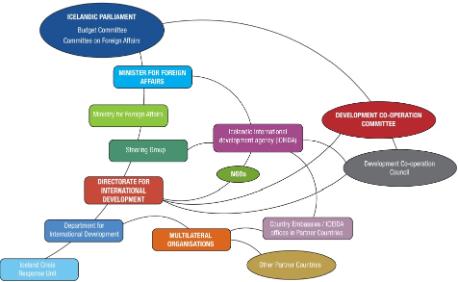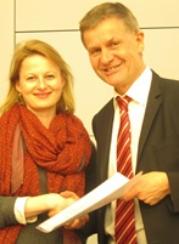Development
The OECD DAC welcomes Iceland as its 25th member
|
|||||
About
Top recipients of Icelandic ODAIceland’s priority partner countries – Uganda, Malawi and Mozambique – were the top three recipients during the 2010 and 2011 period, accounting for 38% of Iceland’s bilateral aid. |
Iceland's development co-operation system Click for larger version of Iceland's development co-operation system Click for larger version of Iceland's development co-operation system
There is a clear division of labour between the Ministry for Foreign Affairs and ICEIDA and good progress has been made in enabling the two organisations to work closer together . |
|
Related links |
Iceland: Taking the initiative on aid effectivenessIceland has engaged in the international aid effectiveness forums over the last six years, and has endorsed the Paris Declaration on Aid Effectiveness; the Accra Agenda for Action (OECD, 2008) and the Busan outcome document (Fourth High Level Forum, 2011). However, as Iceland was not a DAC member at the time, they were not part of the monitoring process for the Paris Aid Effectiveness targets and therefore had not been assessed against the targets. In 2011, Iceland’s bilateral aid agency – ICEIDA - under its own initiative, carried out a systematic assessment of its progress in meeting the Paris Aid Effectiveness Declaration targets. This followed changes in ICEIDA’s legal statutes in 2008, which have enabled ICEIDA to be more able to legally deliver aid in the ways outlined by the Paris Declaration. As a result of its own assessment, ICEIDA has established an ambitious and clear timetable for meeting some of these by 2014. For example, it has set itself the target of ensuring that 70% of its ODA uses partner countries public financial management systems in 2014. In 2009, only 2% went through country systems. |
Related Documents
